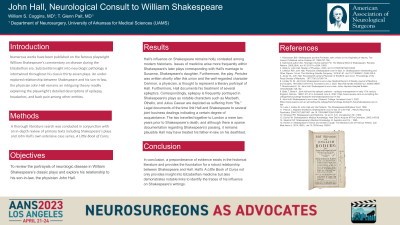John Hall, Neurological Consult to William Shakespeare
Friday, April 21, 2023


William S. Coggins, MD
Resident
University of Arkansas for Medical Sciences
Little Rock, Arkansas, United States
ePoster Presenter(s)
Introduction: Numerous works have been published on the famous playwright William Shakespeare's commentary on disease during the Elizabethan era. Substantial insights into neurologic pathology are intertwined throughout his classic thirty-seven plays. An under-explored relationship between Shakespeare and his son-in-law, the physician John Hall remains an intriguing theory readily explaining the playwright’s detailed descriptions of epilepsy, headaches, and back pain among other entities.
Methods: A thorough literature search was conducted in conjunction with an in-depth review of primary texts including Shakespeare's plays and John Hall's own extensive case series, A Little Book of Cures.
Results: Hall's influence on Shakespeare remains hotly contested among modern historians. Issues of medicine arise more frequently within Shakespeare's later plays corresponding with Hall's marriage to Susanna, Shakespeare's daughter. Furthermore, the play Pericles was written shortly after this union and the well-regarded character Cerimon, a physician, is thought to represent a literary portrayal of Hall. Hall documents his treatment of several epileptics. Correspondingly, epilepsy is frequently portrayed in Shakespeare's plays as notable characters such as Macbeth, Othello, and Julius Caesar are depicted as suffering from "fits." Hall and Shakespeare traveled together and had several joint business dealings indicating a close working relationship. Hall may have treated his father-in-law and was likely present at his death.
Conclusion : A preponderance of evidence exists in the historical literature and provides the foundation for a robust relationship between Shakespeare and Hall. Hall's A Little Book of Cures not only provides insight into Elizabethan medicine but also demonstrates notable links to identify the traces of his influence on Shakespeare's writings.
Methods: A thorough literature search was conducted in conjunction with an in-depth review of primary texts including Shakespeare's plays and John Hall's own extensive case series, A Little Book of Cures.
Results: Hall's influence on Shakespeare remains hotly contested among modern historians. Issues of medicine arise more frequently within Shakespeare's later plays corresponding with Hall's marriage to Susanna, Shakespeare's daughter. Furthermore, the play Pericles was written shortly after this union and the well-regarded character Cerimon, a physician, is thought to represent a literary portrayal of Hall. Hall documents his treatment of several epileptics. Correspondingly, epilepsy is frequently portrayed in Shakespeare's plays as notable characters such as Macbeth, Othello, and Julius Caesar are depicted as suffering from "fits." Hall and Shakespeare traveled together and had several joint business dealings indicating a close working relationship. Hall may have treated his father-in-law and was likely present at his death.
Conclusion : A preponderance of evidence exists in the historical literature and provides the foundation for a robust relationship between Shakespeare and Hall. Hall's A Little Book of Cures not only provides insight into Elizabethan medicine but also demonstrates notable links to identify the traces of his influence on Shakespeare's writings.
